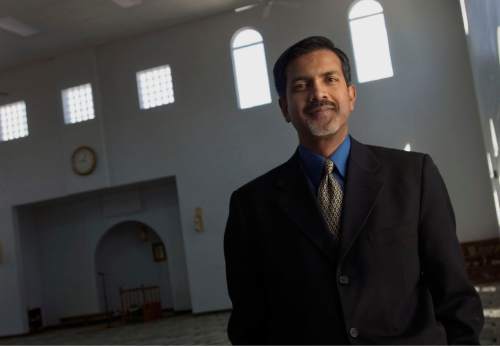This is an archived article that was published on sltrib.com in 2015, and information in the article may be outdated. It is provided only for personal research purposes and may not be reprinted.
Amid the nation's increasingly hostile anti-Muslim rhetoric in the aftermath of the Paris terrorist attacks, the Rev. Patty Willis no longer could remain silent.
Willis, pastor at Cottonwood Heights' South Valley Unitarian Universalist Society, was talking with a friend recently during an interfaith gathering and heard firsthand about rising fears among Utah's more than 30,000 Muslims.
As a person of faith, Willis wanted them to know they are not alone, so she penned a letter to them and is urging other clergy to sign it.
"At this time, when messages of hate are spreading throughout our country and the world, we reach out our arms to your communities and lift our voices in prayer for the well-being and safety of you and your loved ones," Willis wrote. "Our hearts are breaking, as yours are, over the tragic events of the past months, and we abhor the disrespectful rhetoric that is being misguidedly directed toward Muslims. The seed of disrespect often blossoms into hatred and violence. Scapegoating has no place in our society. Instead of facing real wrongs, people are maddened by imaginary ones. … [W]e affirm that we all belong to one another and that the pain inflicted on one of us is felt by us all."
Willis went on to say, "We stand by you and your families and pray that together we can help turn this atmosphere of fear to love."
As of Friday afternoon, at least 30 faith leaders — Christian, Buddhist, Jewish — had signed the missive, including the Rev. France Davis, pastor at Calvary Baptist Church; the Rev. David Nichols, pastor at Mount Tabor Lutheran Church; and Rabbi Ilana Schwartzman, who leads Congregation Kol Ami.
Though there have been no recently reported anti-Muslim incidents in the Beehive State, Iqbal Hossain understands the worry.
"Right now, it's a kind of negative atmosphere," said Hossain, former president of the Islamic Society of Greater Salt Lake. "All the rhetoric coming from people like Donald Trump and Ben Carson and other conservatives doesn't help."
At the Khadeeja Islamic Center in West Valley City, Muslims don't talk about it, he said, "but I can sense some anxiety and uncertainty."
There was a report that a "white person in a car with Nevada license plates parked and took photos of the mosque from the road," he said. "In a normal time, these kinds of things probably wouldn't raise any alarms, but in this climate, the community is on edge."
Such incidents, Hossain said, "aggravate the situation."
The longtime Utah resident is not afraid of violence or physical harm, he said, as much as he is that his faith will be misunderstood and mischaracterized.
He and other Muslim leaders have made clear that the militant Islamic State group, or ISIS, does not represent Islam.
Hossain does not want to be "persecuted or have negative things said about him behind his back because he is a Muslim."
"Humiliation," he added, "is more damaging than if somebody harms me physically."
Fear is too strong a word, said Shuaib Din, imam at the Utah Islamic Center in Sandy, but he has seen a growing unease among members of his mosque.
"For the most part, [Utahns] are reasonable enough to understand that those [terrorists] are only a few and don't represent Islam," Din said. "But there always are one or two crazies [who believe we are all ISIS], and that is what we are fearful of as an organization."
Compared to larger urban centers such as Los Angeles, Detroit, Chicago or New York, he said, "Utah is relatively safe for Muslims."
After all, the state's predominant faith, The Church of Jesus Christ of Latter-day Saints, has endured a history of religious persecution.
Mormons, in particular, "know what it feels like to be a minority," Din said, "to be the 'other.' "
Some polls, he explained, have shown that events such as the Boston Marathon bombing or the Paris slaughter don't incite anti-Muslim sentiment as much as the "election cycle" does.
Politicians, Din added, exploit the "weaknesses and fears of the people."
Like other Muslims, Utahn Maysa Kergaye hasn't seen any violence against her fellow believers in the wake of the Paris assaults.
"There have been more acts of stupidity," she said, by "people who want to take out their anger at Muslims that they don't even know."
Muslim women who wear hijabs — head coverings — are always targets for such jabs, Kergaye said, because they are so easy to identify.
She applauds Willis for her effort to stand with Muslims, but believes it may not reach those who need it most.
"It's not churchgoing people we worry about," Kergaye said. "It is those who listen too much to certain radio personalities who stir up Islamophobia and hate."
For her part, Willis is calling on Utahns to remember that "many of our Muslim neighbors were born here and have a long history in this state." Others, she said, have come fleeing their war-torn homelands.
"Our shared humanity calls us to open our hearts and remember that many of our ancestors came to this country fleeing famine, war and religious persecution," she said. "Let us affirm the rich and varied tapestry that is our nation."
Twitter: @religiongal



